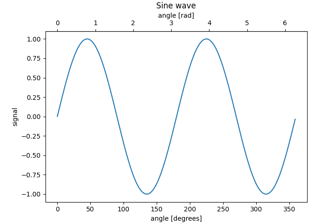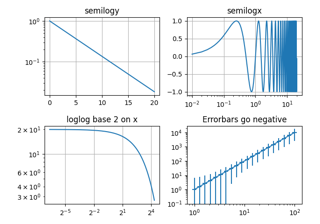matplotlib.axes.Axes.loglog#
- Axes.loglog(*args, **kwargs)[source]#
Make a plot with log scaling on both the x and y axis.
Call signatures:
loglog([x], y, [fmt], data=None, **kwargs) loglog([x], y, [fmt], [x2], y2, [fmt2], ..., **kwargs)
This is just a thin wrapper around
plotwhich additionally changes both the x-axis and the y-axis to log scaling. All of the concepts and parameters of plot can be used here as well.The additional parameters base, subs and nonpositive control the x/y-axis properties. They are just forwarded to
Axes.set_xscaleandAxes.set_yscale. To use different properties on the x-axis and the y-axis, use e.g.ax.set_xscale("log", base=10); ax.set_yscale("log", base=2).- Parameters:
- basefloat, default: 10
Base of the logarithm.
- subssequence, optional
The location of the minor ticks. If None, reasonable locations are automatically chosen depending on the number of decades in the plot. See
Axes.set_xscale/Axes.set_yscalefor details.- nonpositive{'mask', 'clip'}, default: 'mask'
Non-positive values can be masked as invalid, or clipped to a very small positive number.
- **kwargs
All parameters supported by
plot.
- Returns:
- list of
Line2D Objects representing the plotted data.
- list of

